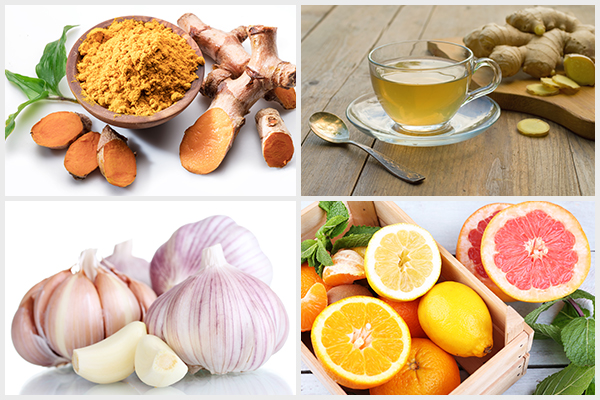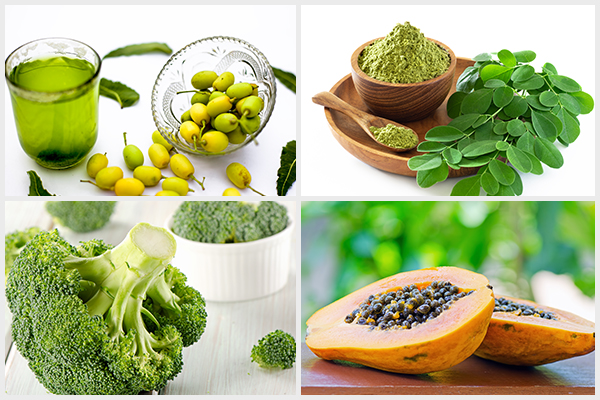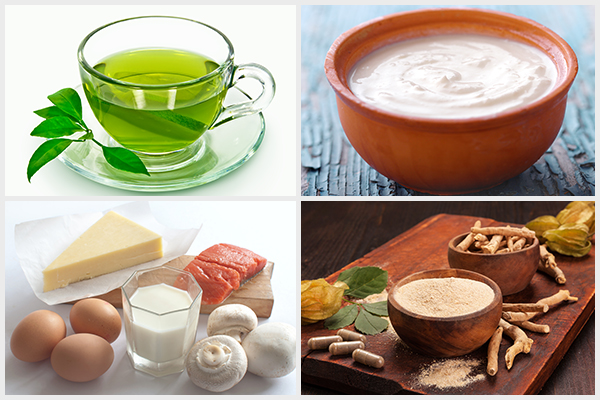In this article:
The immune system is a complex of tissues, organs, cells, and chemical mediators, all of which function together to protect the body from many invaders such as bacteria, viruses, parasites, and cancers. (1)

If the immune system functions well, you are healthy; if not, you fall sick. It is possible to improve the functioning of the immune system through immune boosters, which function in many different ways. (1)
Low immunity may be the result of many factors such as poor nutrition, (2) stress, (3) lifestyle, environmental pollutants, vitamin deficiencies, and age. Lifestyle changes and some simple home remedies are very useful in boosting the immune system and improving disease resistance.
Home Remedies to Boost Your Immunity
Read on to know more about the simple home remedies to boost immunity.
1. Consume turmeric
Curcumin is the active ingredient of turmeric. Curcumin has antioxidant and anti-inflammatory properties that make it an effective immunomodulator.
Turmeric inhibits the growth of many bacteria, fungi, viruses, and parasites (4) and thus protects the body from infection if used regularly in cooking.
2. Incorporate ginger into your diet
Ginger has antioxidant and anti-inflammatory properties. In many traditional medicinal systems, ginger is used as an immune stimulator. (5)
You can add ginger to your cooking daily, or you can take it as an infusion in the form of ginger tea.
3. Try using garlic
Allicin is a sulfur-containing compound found in garlic, to which most of the medicinal properties of garlic are attributed.
Garlic is effective against a number of gram-positive and gram-negative bacteria including the dreaded Mycobacteria (causative agents of tuberculosis and leprosy belong to this genus). Garlic has antifungal activity, particularly against Candida albicans, which is a human pathogen.
Another compound isolated from garlic, ajoene, along with allicin, has antiparasitic and antiviral activities. (6) Thus, regular consumption of garlic as a food additive will protect you from bacterial, fungal, viral, and parasitic infections.

4. Eat citrus fruits
Important polyphenols such as hesperidin, naringin, and narirutin are present in citrus fruits such as oranges and lemons.
It has been demonstrated both in cell culture and animal studies, that these polyphenols have anti-inflammatory action and support immune system function. (7)
5. Neem as an effective immunity booster
Neem (Azadirachta indica) is a complex of various compounds that play roles in the prevention of many bacterial, fungal, viral, and parasitic infections.
Some of the constituents of neem include nimbin, nimbidin, nimbolide, limonoids, quercetin, and ß-sitosterols. Numerous studies have confirmed their role as anti-inflammatory agents.
Neem has been used in traditional Indian, Chinese, and Unani medicine to treat various ailments on account of the above-mentioned properties and hence may be considered an immunity booster. (8)
6. Use moringa
The bioactive constituents of moringa include flavonoids, terpenes, sterols, phenolic acids, glucosinolates, and isothiocyanates. These bioactive compounds make moringa effective in the treatment of chronic inflammation, immune disorders, and diseases caused by pathogens. (9)
7. Consume broccoli
The active ingredient of broccoli sprouts is sulforaphane, a molecule that triggers cellular defense mechanisms and plays an anti-inflammatory role. These properties make broccoli an effective therapeutic agent in the treatment of various bacterial and viral infections. (10)

8. Papaya consumption can bolster immunity
Many studies have demonstrated the immunomodulatory properties of papaya extracts (leaf and seed) in various cell types exposed to a variety of stressors. Papaya has been used effectively in the treatment of dengue fever, malaria, and fungal diseases. (11)
9. Drink green tea
Polyphenols are a class of compounds found in green tea, and they play a role in the induction of a class of immune cells, the T regulatory cells, which maintain immune tolerance and suppress autoimmunity. (12)
10. Consume probiotic yogurt
An improvement in immune function was demonstrated when a combination of nutrients and yogurt was used on animals subjected to strenuous exercise. (13)
11. Increase your vitamin D intake
Vitamin D can modulate the immune response, and a deficiency of vitamin D is associated with autoimmunity and decreased resistance to diseases. (14)

12. Take ashwagandha (Indian ginseng)
Ashwagandha (Withania somnifera) has been used traditionally in Indian medicine for the treatment of a variety of ailments due to its immunomodulatory effects.
A study conducted in 2021 has demonstrated for the first time that the leaf and root extract of ashwagandha possesses potent immune-stimulatory properties. It enhanced the activity of Th2 (T helper cell subset 2), a type of immune cell, enhanced the secretion of a chemical modulator IL4 (interleukin 4), and enhanced the expression of Th1 (T helper cell subset 1). (15)
These results demonstrated that ashwagandha can be used as an addition to immunity-boosting herbal supplements.
13. Exercise regularly
Physical activity can lead to a healthy life. It helps maintain ideal body weight, prevent inflammation, prevent metabolic disorders such as diabetes, and even boost immunity to prevent common transmittable diseases such as viral infections.
Physical exercise, both regular and occasional, can significantly alter the body’s immunity. The degree of benefit depends on the intensity and frequency of physical exercise.
Moderate-intensity exercise can help increase cellular immunity, which helps fight against pathogens. (16)

14. Get adequate sleep
Not getting sufficient sleep for long periods or every day can activate your body’s stress response. This can decrease your immunity and make you prone to diseases. (17)
Normal adults need at least 7 hours of sleep per day to maintain their health.
Most-Asked Questions About Strengthening Immunity
What foods should I eat to maintain a healthy immune system?

A balanced diet helps in maintaining a healthy immune system. Fiber-rich foods such as whole grains and legumes, colored fruits and vegetables that are rich in antioxidants and minerals, and foods rich in healthy fats such as avocado and olive oil are recommended to maintain a robust immune system.
What foods should I avoid?
Avoid foods such as processed meat and refined carbohydrates such as bread, pizza, and pasta. Avoid junk foods and foods containing added sugar.
What is immunity?
The immune system is an organ system in the body that helps protect it. It distinguishes between self (the body cells) and nonself molecules (invaders or pathogens) and prevents infections, diseases, etc. It classifies the molecules it recognizes as antigens.
Immunity is regulated by many factors: the physical barrier being the first one. The body’s physical barrier consists of the skin, cornea, mucous lining of the gastrointestinal tract, genital and urinary tract, etc. (18)
What causes immunodeficiency?
Certain diseases and deficiencies can cause immunodeficiencies. These include:
- Metabolic conditions such as diabetes and hypertension
- Cancer
- Nutrient deficiencies (iron, protein, etc.)
- AIDS (an immune disorder caused by HIV infection) (19)
How do I know if I have immunodeficiency? Are there cardinal (essential) symptoms?
Immunodeficiency can cause respiratory tract infections such as bronchitis and sinusitis or gastrointestinal infections. Sometimes, it can cause more severe infections such as sepsis.
Immunodeficiency can also be suspected in children or infants with chronic diarrhea, lethargy, unusual infections (e.g., adenovirus), chronic encephalitis, seizures, skin lesions, warts, etc.
Herpes simplex virus, varicella-zoster virus, etc., are also uncommon infections in children that may indicate immunodeficiency. Patients with autoimmune diseases such as hemolytic anemia are also at risk of immunodeficiency.
What tests are done to detect immunodeficiency?
The patient is tested for secondary conditions that may be causing immunodeficiency such as diabetes and AIDS. These tests include:
- Complete blood picture (CBP)
- Antibody tests
- Hypersensitivity tests
- Fasting blood sugar
- Stool tests
Final Word
The use of any of the above-mentioned foods/herbs along with good lifestyle practices could go a long way in helping your body combat disease and improve your health.
Good lifestyle practices include:
- Exercising regularly
- Getting the required amount of rest that your body needs
- Avoiding stress
- Avoiding/limiting smoking and alcohol consumption
- Maintaining personal hygiene
- Keeping your body hydrated to flush out toxins
- Was this article helpful?
- YES, THANKS!NOT REALLY


